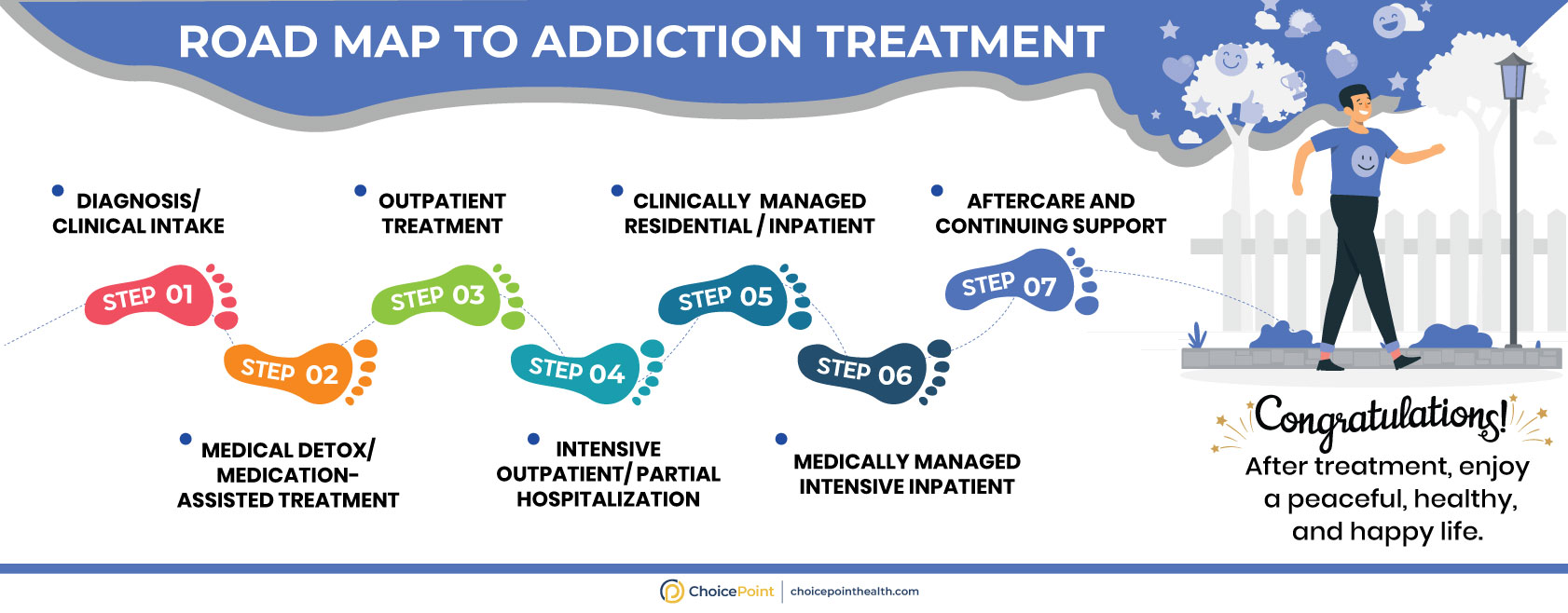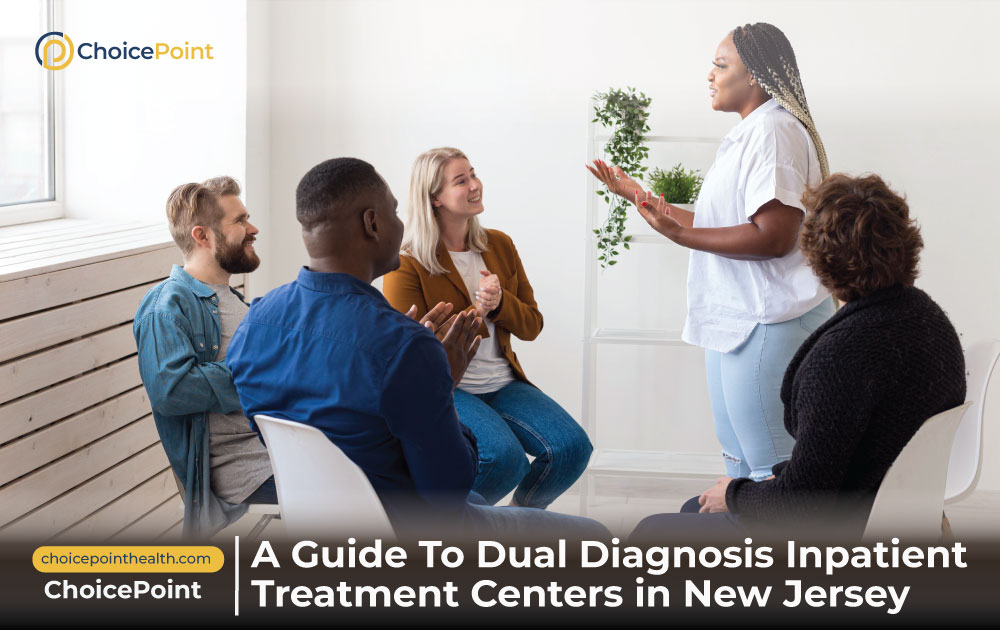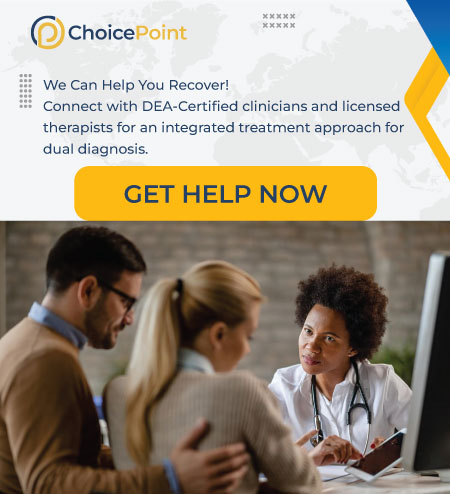Did you know that a recent study found a 48% prevalence of dual diagnosis in children aged 12-20 years old? Yes, you heard that right, children! Imagine if children are susceptible to a dual diagnosis; the stats for the adults are rightly through the roof. Fortunately, more and more attention is being given to dual diagnosis treatment. Read on as we guide you about inpatient dual diagnosis treatment centers in NJ and address your concerns about:
- Treatments offered at inpatient dual diagnosis treatment centers
- What can you expect at a dual diagnosis treatment center in New Jersey?
- How do you shortlist the best dual diagnosis treatment center in NJ?
Addiction treatment is a journey that transforms despair into hope and resilience. To connect with a licensed doctor at ChoicePoint, please contact us at 844.445.2563.
Table of Contents
3 Facts To Know About Dual Diagnosis
Dual diagnosis, also known as co-occurring and comorbid disorders, is a term used when both addiction and mental health disorders occur simultaneously. Substance abuse and mental health disorders are often closely linked. A person may resort to drugs because of mental health issues. Similarly, substance abuse may be the culprit of deteriorating mental health.
In co-occurring disorders, knowledge is power. The more you know, the better decisions you can make about your recovery. Here are some interesting facts about dual diagnosis:
FACT 1# Dual Diagnosis Is More Common Than You Think
The odds that a person experiences both substance abuse and mental health problems might seem rare, but it is pretty common. It has been estimated that in 2019, 9.5 million people in the U.S. experienced both substance use disorder and mental health issues.

Here Is An Alarming Fact: 1 in 4 people experiencing a mental health problem also suffers from substance abuse.

Here Is An Alarming Fact: 1 in 4 people experiencing a mental health problem also suffers from substance abuse.
FACT 2# Some Mental Health Disorders Are More Commonly Linked To Substance Abuse
Mental health complications are often the most common and dangerous effect of substance use disorder. Some common illnesses linked with addiction are:
- Anxiety disorders
- Depression
- ADHD (Attention-Deficit Hyperactivity)
- Personality Disorders
- Post Traumatic Stress Disorder

Did You Know ? Youth is at a greater risk of comorbid disorders! Untreated Mental health disorders and drug use at a young age increase the risk of developing serious addiction problems later in life.

Did You Know ? Youth is at a greater risk of comorbid disorders! Untreated Mental health disorders and drug use at a young age increase the risk of developing serious addiction problems later in life.
FACT 3# For Complete Recovery, Co-occurring Disorders Must be Treated Simultaneously
The notion that you need to get treated for addiction first before receiving help for mental health issues is very outdated. For complete recovery, both issues must be addressed simultaneously.
Most Common Disorders Treated At Dual Diagnosis Inpatient Treatment Centers In NJ
A good thing about addiction treatment is that it is fully customizable to your unique needs. Dual diagnosis treatment demands individualized treatment because the combination of mental health disorders and substance abuse is innumerable.
One patient might suffer from cocaine addiction and anxiety, while others may have meth addiction and ADHD. Some common co-occurring disorders include:
Drug Addiction and Depression
Several studies show that drug use has been linked to depression. It has been reported that cocaine addiction produces a variety of psychiatric symptoms, including depression. This does not end here; drug abuse has been linked to 18% -22% of suicidal cases.
This is why an inpatient setting is the best care to help people recover in a safe environment. The clients recover fully under medical supervision and are taught coping mechanisms and skills to maintain their sobriety in real life, too.
Alcoholism and ADHD
ADHD (Attention-deficit/hyperactivity disorder) is a neurobehavioral disorder. It is an ongoing pattern of inattention or hyperactivity that interferes with normal functioning and development. Research shows that half of patients suffering from ADHD had substance use disorder, and among those, an alarming 18% suffered from alcoholism.
Opioid Addiction and PTSD
Tons of data show that Post Traumatic Stress Disorder (PTSD) is prevalent in patients with opioid addiction. PTSD is a serious mental illness. To ease the suffering, people often resort to opioids such as Fentanyl, Oxycodone, Hydrocodone and illegal opioids, such as Heroin. All these drugs have high abuse potential that may lead to addiction.
And the list of dual diagnoses goes on. If your condition is not listed above, it does not mean it is not treatable. You can connect with experienced medical staff at ChoicePoint to discuss your condition. We offer complete guidance regardless of whether you become our client or not.

Treatment Roadmap To Recovery
Know Within 5 Minutes If You Are Suffering From Addiction
You know there is a quick, easy, and discreet way to know if you are suffering from addiction. Experts develop addiction assessment tests to help you determine your levels of addiction. The whole process takes less than five minutes. You can also share the test with your friends and family or someone you know who is struggling with substance abuse. Take our confidential addiction assessment test today to know if you are suffering from addiction.
Insight From the Clinical Director On Dual Diagnosis
“I fundamentally view addiction as a wholesome recovery path. Recovery from addiction is like a second chance at life. I strongly believe that wholesome recovery is only possible by addressing the underlying causes of addiction. When you treat the roots of addiction, only then can a person flourish.
Dual-Diagnosis is an excellent program to heal both the emotional and physical aspects of addiction for holistic healing. – Jessica Plonchak
What is The Plan of Action For Treating Dual Diagnosis In An Inpatient Setting?
Co-occurring disorders can be challenging to treat. A lack of care in either disorder can lead to a relapse, which is why inpatient treatment is usually recommended for the treatment. An inpatient setting offers the highest level of care according to ASAM criteria. The roadmap for treatment may look like this:
a. Detoxification Is Usually The First Step In Rehabilitation
Detoxification is cleansing your body of drugs under medical supervision. This step ensures that a person is physically stable and drug-free to start the maintenance phase of treatment along with therapy.
Some FDA-approved medications that have been proven beneficial for addiction include:
- Subutex – To treat opioid addiction
- Suboxone– Used in managing withdrawal symptoms in opioid detox
- Naltrexone – Used to treat opioid and alcohol addiction
- Disulfiram – Used to treat alcoholism
You may also be given antidepressants for mental illness, depending on your condition.
b. Therapy Is The Core Of Dual Diagnosis Treatment
An integrated approach is usually the best treatment for co-occurring disorders. After medication-assisted treatment, a psychological approach toward treatment takes center stage.
Research suggests that therapy plays an important role in:
- Completing the treatment program
- Maintaining abstinence from drugs
- Coping with triggers
- Maintaining a healthy lifestyle
- Better transition and integration in the community
- Overall improvement in social, physical, and mental health
Some examples of psychotherapy that proved beneficial in the treatment of co-occurring disorders include:
- Cognitive Behavioral Therapy
- Dialectical Behavioral Therapy
- Group Therapy
- Family Therapy
- Individual Therapy
Dual diagnosis is treatable if you commit to the treatment. By seeking help for addiction and mental health illness, you can work on reclaiming the healthy, sober, and fulfilling life you deserve by calling 844.445.2563.
c. Sobriety Maintenance Is The Most Important Step
Detox is considered a short-term treatment. For complete drug abstinence and dual diagnosis treatment, a comprehensive care plan is the way to go. After detox, you may be put on some maintenance medications to reduce cravings and improve your mental health. Patients are offered aftercare plans and counseled on how to avoid falling back into the same patterns. You will learn to:
- Manage and deal with the cravings
- Improve self-esteem
- Adopt a healthier lifestyle
- Focus on self-care and healing
- Identify and manage triggers
Did you know ChoicePoint offers an online prescription program for suboxone and other MAT drugs so you do not have to wait in lines to get a prescription refill? To learn more, please call us at 844.445.2563.
Checklist To Shortlisting The Best Dual Diagnosis Program in NJ
Looking for NJ’s best dual diagnosis programs can be overwhelming and confusing. To help you shortlist, we have prepared a foolproof checklist to help you choose the best addiction and mental health treatment center.
You need to ask the following questions:
- Does the facility offer integrated treatment for both disorders?
- Are the doctors DEA-certified?
- Are treatment plans personalized?
- Does the center offer virtual support?
- Does the facility offer other levels of care in addition to inpatient treatment?
- Is the staff and customer service friendly?
- Does your insurance cover the cost of treatment?
Dual Diagnosis Inpatient Treatment Center In NJ, Fairlawn
If you or a loved one is looking for an inpatient dual diagnosis treatment center in NJ, look no further. ChoicePoint believes in incorporating the latest medical strategies, compassion, and care to provide high-quality treatment.
Some benefits of our dual-diagnosis treatment include:
- Simultaneous treatments of both disorders
- Trauma-Focused Treatment
- Improved quality of life
- Reduced Relapse Rates
We take pride in our excellent treatment services and ethical values. Here is what a patient has to say
The staff and support here is nothing short of the best, and the technology they’ve incorporated into their program is raising the bar for treatment services moving forward. I highly recommend this program to anyone struggling with addiction.” – Justin Johnson.
The staff and support here is nothing short of the best, and the technology they’ve incorporated into their program is raising the bar for treatment services moving forward. I highly recommend this program to anyone struggling with addiction.” – Justin Johnson.
Top Questions People Ask Us About Inpatient Dual Diagnosis Treatment Centers
More of your queries related to dual diagnosis inpatient treatment centers in NJ are addressed below:
What Is The Most Effective Treatment For Dual Diagnosis?
The treatment depends on the type of disorder you are experiencing. The best approach is holistic care and integrated treatment in which both disorders are treated simultaneously. To give you an example, if you are suffering from alcohol use disorder and depression, you may be recommended to a medication-assisted program for alcoholism and therapy for depression.
What Medications Are Used For Dual Diagnosis?
Medication depends on the type of your diagnosis. Some commonly prescribed medications include:
- Antidepressants for mental health disorders
- Naltrexone for alcoholism
- Suboxone for opioid dependence
- Subutex for opioid dependence
What Are The Current Treatment Approaches For Dual Diagnosis?
The updated approach includes a
- Medical diagnosis
- Holistic treatment of substance abuse according to DSM-V criteria
- Solution-based targeted therapy.
- Medical counseling
- Aftercare and relapse prevention plans
Why Is Dual Diagnosis Important?
Dual diagnosis is important because:
- It treats both mental health and substance abuse disorders.
- It helps a person to recover as a whole.
- Simultaneous treatment of both disorders reduces the chances of a relapse.
Are There Any Potential Risks Of Dual Diagnosis?
Untreated dual diagnosis can be harmful to you. Without medical treatment, mental disorders and addiction can aggravate, resulting in the following:
- Suicidal thoughts
- Risk of substance overdose
- Mental health disorders such as depression and panic attacks
Medical Disclaimer:
ChoicePoint aims to improve the quality of life for people struggling with substance use disorder and mental health issues. Our team of licensed medical professionals research, edit and review the content before publishing. However, this information is not intended to be a substitute for professional medical advice, diagnosis, or treatment. For medical advice please consult your physicians or ChoicePoint's qualified staff.











Review A Guide To Dual Diagnosis Inpatient Treatment Centers in NJ.